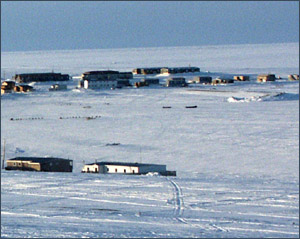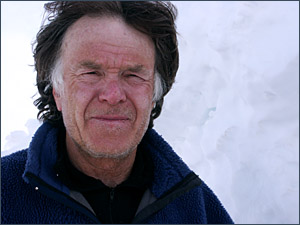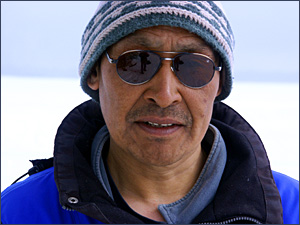|
The Secrets In Ice Cores
by Daniel Grossman
part 1 2 3 4
 |
Iglulik, an Inuit community in Nunavut, in Northern Canada - (larger version) |  |
polar explorer Will Steger |  |
Theo Ikummag, an Inuit hunter in Iglulik - photos by Daniel Grossman |
Polar Expeditions Reveal Dramatic Change
Approximately 1200 miles below the North Pole, the town of Iglulik is among the northern-most inhabited lands on Earth. The tiny hamlet forms a crescent of pale-colored homes along one shore of a rocky island. Snowmobiles are parked in front of every house. There's plenty of snow and the sea is frozen solid - even in mid-May. Adventurer Will Steger arrived here by dog sled. With three teams of huskies to pull his baggage, he walked and skied halfway across Canada through more than two months of total Arctic darkness and months of temperatures of 30 degrees below zero or lower. Though a slight man with hunched shoulders, Steger is legendary for his polar exploits. He's walked across both the South and the North Poles and discovered first-hand the impact of global warming.
"We traveled 12 years ago across the Larson Ice Shelf in Antarctica," says Steger. "It was 300 miles long at that time. That entire ice shelf now is in the ocean. We based an expedition in the Arctic on the Ward-Hunt Ice Shelf when we went to the North Pole. That is the largest ice shelf in the Arctic, and that has slipped into the ocean."
On his travels, Steger is collecting impressions of Inuit hunters and elders about climate change in the Arctic. He makes a stop at the home of hunter Theo Ikummag. Ikummag says the weather has become more variable and harder to predict. Snowfields that previously were permanent now completely melt by late summer. Their sweet melt-water is no longer available to quench the thirst of Inuit and caribou. Ikummag says that the prevailing wind direction has also shifted. Inuit use icy ridges in snow that parallel the direction of prevailing winds to find their way even in the worst weather, and Ikummag says the change has been disorienting.
"What we are finding with this is the elders tend to loose their direction. Us younger folks, we use the GPS and whatever gadgets that are available to us. But with the elders, their whole world is changing. Now they can actually get lost. It's not fun. Following an elder and the elder is lost. Go figure !"
The 50-year old hunter says he's also noticed changes in wildlife.
"Talking to my older brother, he was 21 years older. As a child he said, the closest ground squirrel that they could find ... was 70, 75 miles south. Now they are all over the place. Even on the island itself."
Ikummag tells Steger that, like the ground squirrel, foxes, wolverines, birds, even lake trout are moving north.
"So all these animals are migrating north," Ikummag continues. "They're reaching further north every year, is what we're finding."
"Would that a good thing for your culture?" asks Steger.
"It might be good for the culture, but might be chaotic for the wildlife as well. They need a certain equilibrium in order to survive."
Next - Uncharted Territory
|

